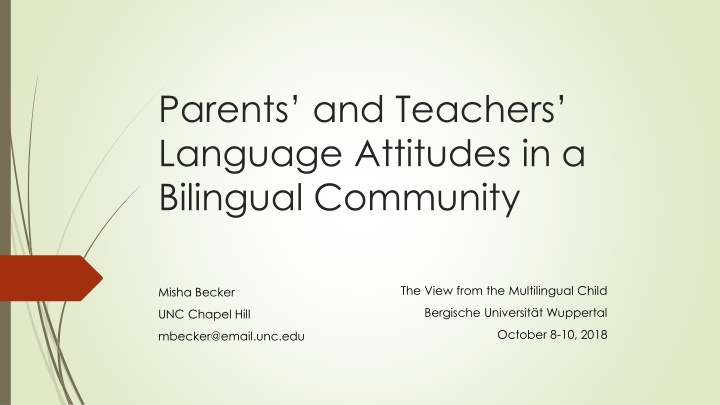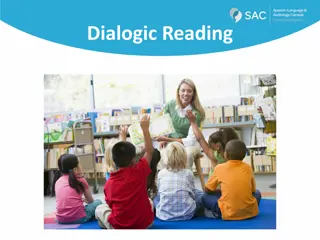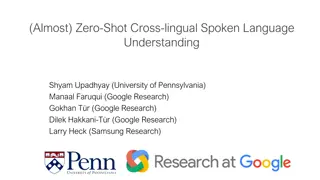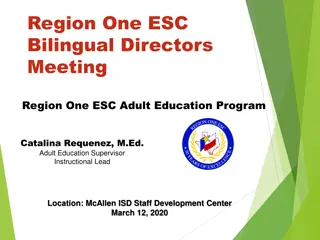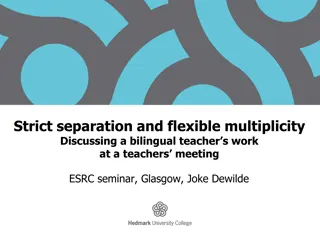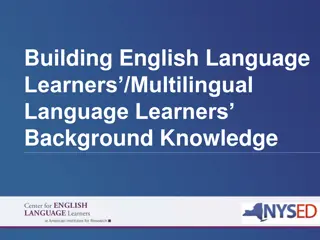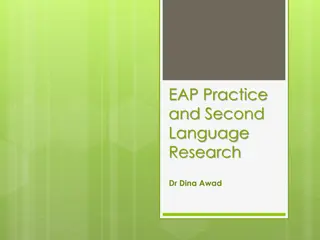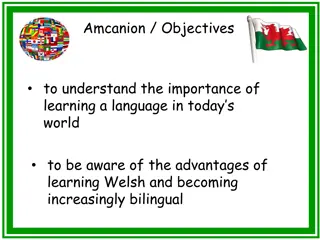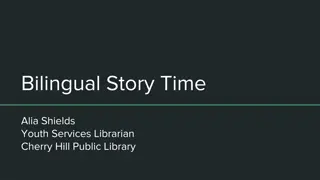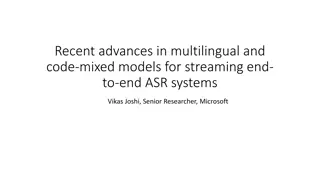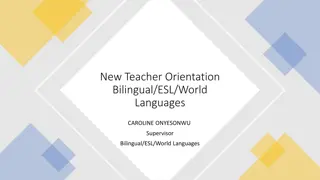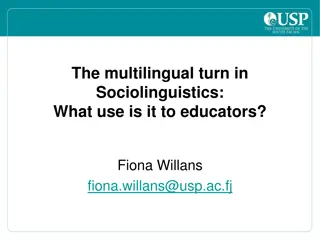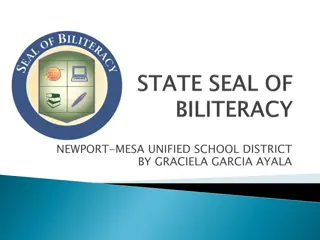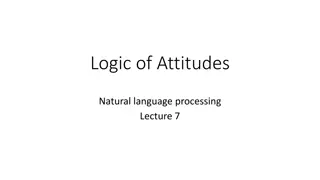Language Attitudes in a Bilingual Community: The Multilingual Child
Examining the perspectives of parents and teachers on language attitudes within a bilingual community, this study by Misha Becker explores insights from multilingual children. The research was conducted in collaboration with Bergische Universität Wuppertal and UNC Chapel Hill in October 2018. For further inquiries, contact mbecker@email.
Download Presentation

Please find below an Image/Link to download the presentation.
The content on the website is provided AS IS for your information and personal use only. It may not be sold, licensed, or shared on other websites without obtaining consent from the author.If you encounter any issues during the download, it is possible that the publisher has removed the file from their server.
You are allowed to download the files provided on this website for personal or commercial use, subject to the condition that they are used lawfully. All files are the property of their respective owners.
The content on the website is provided AS IS for your information and personal use only. It may not be sold, licensed, or shared on other websites without obtaining consent from the author.
E N D
Presentation Transcript
Parents and Teachers Language Attitudes in a Bilingual Community The View from the Multilingual Child Misha Becker Bergische Universit t Wuppertal UNC Chapel Hill October 8-10, 2018 mbecker@email.unc.edu
Rationale Among (some) parents in the Eastern Cherokee community (North Carolina, USA) there is a tension between their desire for their children to learn Cherokee and concern that their children won t have enough English instruction. There is also concern among Cherokee teachers about the high degree of English use among students in social interactions, code-switching. Vitoria-Gasteiz is a mostly Spanish-speaking environment in which enrollment in Basque immersion schools has risen and continues to rise. 1. What motivates parents to enroll their children in one school model or another? And how do they view Basque, Spanish and English in terms of their importance and roles in their children s lives? 2. How do teachers approach Basque and Spanish and their interaction, for example in code-switching?
Background: Language Basque is a minority language (isolate) spoken in the Basque Country (Northern Spain/Southwestern France) Basque Autonomous Community By Unai Fdz. de Beto o, based on User:Theklan - http://commons.wikimedia.org/wiki/Image:Euskal_Herriko_mapa_kolore ztatua.png, CC BY-SA 3.0, https://commons.wikimedia.org/w/index.php?curid=5019680
Background: History Basque was prohibited during the Franco regime (1939-1975) In 1900, 83% of the Basque population were Basque speakers; by 1975 only 24% were (Lasagabaster, 2001) In 1978 Basque was given co-official status with Spanish 1982: Basic Lawon the Standardization of the Basque Language Every student has the right to be taught in Basque and Spanish Three school models: Model A: Vehicular language is Spanish; Basque taught as subject Model B: Vehicular language is both Spanish and Basque (mixed) Model D: Vehicular language is Basque; Spanish taught as subject Model D schools grew out of Ikastolak, which had operated in secret during the Franco era
Current Status: Language Basque is spoken by 631,000 people (33.9%) within the Basque Autonomous Community (BAC) (6th Sociolinguistic Survey, 2016) Basque speakers Passive Basque speakers Monolingual Spanish speakers
Previous Studies Vega-Bayo & Mariel (2015): home language significantly influences school choice For Basque-speaking families, school choice is not affected by parent education, other variables Interaction with wealth: poorer families choose public Basque schools Why? Language is tied to jobs. Mariel, Scarpa & Vega-Bayo (2018): In Bilbao, language of instruction is a significant factor in parent choice and exhibits the most parental alignment
Background: Previous Studies Other studies of language attitudes by teachers (Valadez et al. 2015) or in the general population (Amorrortu et al., 2009) look at the whole BAC But the region that Vitoria is in ( lava) is much more Spanish-speaking than the rest of the BAC Perhaps we might find different attitudes here; more applicable to Cherokee (English-speaking environment)
Present Study The focus of the present study was on parents and teachers language attitudes specifically in Vitoria-Gasteiz Why model D (Basque immersion) parents enroll their children in model D schools in a mostly Spanish-speaking region Why model A (Spanish) parents don t enroll their children in Basque schools Whether (and if so, why) they think it s important for their children to know Basque Teachers experience with code-switching in the classroom or school environment How both parents and teachers feel about the two languages, and how they see both languages (and English) in terms of cultural considerations and future work opportunities for today s children.
Participants I conducted in-depth structured interviews with 11 parents and 9 primary school teachers in Vitoria-Gasteiz Code Model Public/Semi-Private Grade(s) Native Lg (L2) Home Language* PD1 D Public 4, 6 Spanish (Basque) Spanish PD2 D Public 6 Spanish Spanish PD3 D Public 6 Spanish Spanish PD4 D Public 3, 6 Spanish (English) Spanish PD5 D Public 6 Spanish (Basque) Spanish/Basque PD6 D Semi-private 1, 5 Basque (Spanish) Basque PB1 B/Tri Semi-private 2 L.Am. Spanish Spanish PB2 B Public preschool B.Portug. (Spanish) B. Portuguese PB3 B, A Public, Semi-private * Spanish Spanish PA1 A/Eng Semi-private 4 Spanish Spanish PA2 A/Eng Semi-private 4 Spanish (Basq/Eng) Spanish *Reported by parents; consistent with teachers estimates of home language
Participants I conducted in-depth structured interviews with 11 parents and 9 primary school teachers in Vitoria-Gasteiz Code Model Public/Semi- Private Public Grade Years Exp Native Lg (L2) TD1 D 6 30 Spanish (Basque) TD2 D Public 6 32 Basque (Spanish) TD3 D Public 1 30 Basque (Spanish) TB1 B/Trilingual Semi-private preschool 3 Basque/Spanish (English) TB2 B Public director 37 Spanish (Basque) TA1 A Public 5 21 Spanish (Basque) TA2 A/English Semi-private 4 18 Spanish (English/Basque) TA3 A Public director 41 Spanish TA4 A Public 5 7 Basque (Spanish)
Method Interviews were conducted in Spanish in people s homes, in schools, or at the University of the Basque Country in Vitoria-Gasteiz Interviews lasted between 20 and 68 minutes (mean=34 min); although interviews were structured participants were not limited in their responses Interviews were audio recorded and transcribed, then reviewed by a native Spanish speaker Responses were analyzed qualitatively using MAXQDA coding software Codes corresponded to themes I had asked about (e.g. Motivation, Peer Language) or themes brought up by several participants (e.g. Immigration, Politicization) Results are presented here by grouping responses around issues I think will be relevant and helpful for the Cherokee community.
Reasons for School Choice For some parents it is an emotional decision (either for or against Basque) For Basque: PD1: Because I want my children to live in Basque. Normally here in Vitoria we use a lot of Spanish, and, well, I want my children to live in Basque too. PD2: ...I think that in principle you have to teach them it s here that they were born, where they live, and that they have to continue maintaining the language. Against Basque: Both model A parents specifically did not want emphasis on Basque, but not because of concern about Spanish instruction. Instead: resentment about the language requirement for jobs and the decrease in model A school options.
Reasons for School Choice Other parents had a more practical reasons for choosing or not choosing model D (Basque): Model D: PD4: [Learning Basque] seems to me important for purely work-related reasons, that they ll need Basque for many types of jobs, and not knowing Basque means closing the door to these jobs. Model B: PB2: her daughter s cousin attended that school PB3: neighborhood school that offered both B (mixed) and D (Basque); chose B because she thought math would be easier in Spanish than Basque
Reasons for School Choice Importantly, no parent cited fear of their child not learning enough Spanish as a reason for not enrolling in model D. PD4: They speak [Spanish] perfectly, they read perfectly, much better than they speak or read Basque, and they write ... I don t know, they write well. [...] I mean, Spanish is secure. General feeling that model B (mixed) is insufficient for reaching fluency in Basque Impression is consistent with studies showing that model D (Basque) students graduate with better proficiency in Basque than model B (Lasagabaster 2001) Relevant for Cherokee parents and administrators who want to allow more time for English instruction Both emotional and practical motivations are important for parents.
Challenges for Basque: Motivation and Social Language How to motivate kids to use Basque in social relationships? Children will gravitate towards the majority language in their social interactions Model D parents: their children all know Basque, and their children s friends know Basque, but the children all speak Spanish together (socially, including in the school yard) Model B and A parents: all children prefer speaking Spanish Why? (Model D) could stem from coolness factor PD5: Castellano es m s guay (Spanish is cooler) or from wanting to be inclusive/accommodate kids who don t speak Basque
Challenges for Basque: Academic Language Concern that children associate Basque only with academics PD6: The work that the teachers do in the classroom is strongly tied to Basque, but there s a sense that Basque is presented in a manner that s too academic. And ... It doesn t have to be that way. Because otherwise that language will acquire an importance only for studying. And Basque isn t something that is valid only for studying in school. It s something that you need for later. .... So our ikastola provides an academic context that s very strong in Basque, but outside of the academic environment, like during recess or lunch, Basque loses some of its strength and value because the language of the majority of the boys and girls is not Basque but Spanish.
Code-Switching at School at home Model D: Teachers note that their students speak Basque in the classroom, but Spanish outside the classroom Model A and B Teachers: students mostly speak Spanish to each other (and Model A students generally do not know Basque, despite 4-5 hours/week) Parents sometimes speak to their children in Basque and their children respond in Spanish: PD3 lamented that his children are missing an opportunity to practice and strengthen their Basque PD6 continues in Basque and said it doesn t really bother him. His wife said it bothers her a lot because Well, because it makes me feel really weird since I ve always spoken to them only in Basque since they were born. So it makes me angry that the environment is so powerful. Relevance for Cherokee: code-switching is not in itself problematic, but it is important to give children opportunities at home to use the minority language, and to encourage use of the minority language in school.
Academic Concerns No one expressed any worry about the children s knowledge of Spanish, or the quantity/quality of Spanish instruction. However, PD4 and PB3 expressed a concern about the level of learning, i.e. mastering academic material, when the medium is Basque and the children s home language is Spanish. PD4: In the case of my daughter, several times they ve let me know there was a problem [in school]. But for her the problem was in understanding Basque, not in understanding the material. [...] And in a school like ours where few parents are Basque speakers, that implies that the level of learning is going to go down. PB3: For my children, I think if they had done it in Spanish they would have done better. Because in their school they focused a lot on learning Basque, they really pushed Basque ... and I think the kids missed out on gaining some types of knowledge.. Relevance for Cherokee: Academics are important; find ways to strengthen pedagogy
Language and Future Work Prospects The language requirement for public sector jobs is a big motivator for people to learn Basque. Recall PD4 s reason for enrolling his kids in Model D PD4 also observed that people tend to stay in Vitoria and BAC On the other hand, if this is the main motivation for learning Basque, this could be part of the reason Basque is not spoken more in Vitoria: TD2: There are people who know Basque but they don t have much interest in using it, mainly because generally they learned Basque only because it was a work requirement, but they don t have that sentimental motivation like it s their language.
The Issue of English Most people drew a distinction between local (Basque), national (Spanish) and global (English) zones, and responses did not vary by model There was a general sense that English was going to be important no matter what. All teachers noted the importance of English for future opportunities, but only model D teachers (and TB1) expressed the need to continue emphasizing Basque over English, at least at the primary level. TD1: Sometimes we ve considered [teaching more English], but we see that if we introduce more hours of English, we have to take away hours of Basque. So sometimes we think that at least in elementary school we need to give more weight to Basque than to English, at least here. That has been our decision.
Role of Parents Teachers emphasized that they can only do so much to motivate children, and that parents play a crucial role. But recall that most parents don t speak Basque TB2 noted that this is more feasible for parents who speak Basque or are wealthy enough to afford extra camps and activities. It s not the same as in a school where a large majority of the families of the children enrolled are people with university degrees, who have a high level of culture, who have a high socio-economic status, who can attend to their children-- -I don t mean helping them with homework, but taking them to extra classes or tutoring if they re struggling, for example. Or even taking them to the theater, to films, to go skating, to camps... [In the public schools] a high percentage of the students families, their main worry is eating and surviving from day to day, so then [the parents] can t be bothered with lots of things because they re focused on working three jobs in order to let their kids get ahead, etc., etc. And so, for sure, the situations for students today in a private school and a public school are very distinct. Relevance for Cherokee: Cherokee parents are struggling to find time to learn the language themselves
Societal Factors: Immigration Several participants talked about immigration in positive ways: PD5: Arabs come here, South Americans, ... well, something that unifies all of us is Basque. Our children are all studying in Basque. PB2: learning Basque is not a problem for young immigrant children but poses challenges for adolescents. Immigrants and the notion of burden : PB3 felt that her children s education was slowed down by the large number of immigrant children in the classroom, which she felt the system did not have sufficient resources to really help. TA3 talked about Basque being an extra burden for immigrant children. TA1 talked about the importance of making immigrants feel included: he encourages them to think of themselves as Basque-Moroccan or Basque-Algerian etc.
Conclusions: Take-Aways for Cherokee 1. Even in a community in which the number of speakers of a minority language is rising, the minority language will face challenges: a. children will gravitate toward the majority language in their social interactions b. need for support from parents outside of school (home use/value, extracurriculars) c. concern about the language being associated only with academics 2. Parents do not need to be speakers of the minority language themselves! But they must value it and reinforce its use. 3. Parents should not worry about their children learning the majority language. 4-5 hours per week in school is sufficient. (Though quality of teaching can be a concern.) 4. Tying the language to job access is a big motivator, but: a. This will also create resistance/feeling of discrimination in some non-speakers b. Also this is not sufficient to ensure everyday/informal use of the language 5. Immigration is not a big issue for Cherokee, but: make learning the language a priority for all members of the community.
Thank you! Muchas gracias! Eskerrik Asko! ! I am grateful for support from the Pogue Senior Faculty fellowship from UNC-Chapel Hill, and to members of the Hizkuntzalaritza Teorikoko Taldea (HiTT) Theoretical Linguistics Group at University of the Basque Country, especially Myriam Uribe-Etxebarria, Javier Ormazabal, Agust n Vicente, Be at Garaio and Leire D az de Gere u
Bilingualism Parents and teachers generally see bilingualism as something positive. TA2 makes an interesting observation about the ease of learning a 3rd language compared to a 2nd: Anyway what we ve seen in model B is that sometimes, when the children are already accustomed to making the effort to learn Basque, if you require them to make the effort to learn English it doesn t tax them as much. I mean, they do it well, they learn. Maybe if we compare model B students, who already have Basque and have to learn English, with model A which is just Spanish and a few short hours of English, in model B it s less of an effort. So maybe model B has a slight advantage.
Language and Identity TB1: For me it is a treasure, it s culture, it s something I have and I have to teach it and I have to use it. So for me it s a treasure. TB2: I think that language forms part of our identity, but the fact of knowing Basque or not doesn t change us into different people. Look, oddly enough, when I finished my university studies, where very few people knew Basque, I already had a pretty good level of Basque. At that time I was, in certain circles, like the Basque. And, oddly, ... at other times of my life because I argued in favor of both Basque and Spanish, I was branded a fascist., ... or let s say very pro-Spanish. When in reality I don t consider myself either pro-Spanish or pro-Basque. ... I saw myself classified in these two ways at different moments of my life because I used one language or another, when really I was the same person.... For me knowing Basque forms part of my identity, but I don t become someone more or less important for the fact of knowing it.
Language and Identity How do your students feel about the relationship between language and identity? TA1: How do they feel? Good question. I d like to know! Because many of them don t feel... many don t know where they are, they don t know if they re Spanish or if they re Moroccan, or Algerian or Pakistani, or because they re from here, but the locals here treat them like foreigners. And when they return to their homes or to their countries of origin, the people there treat them like foreigners too. Because they re not from there. So they have a problem of identity. For that reason I like to tell them they re Basque-whatever [Basque-Moroccan, Basque-Algerian, etc.]. To give them an environment. I don t know.
Immigration and Public vs. Semi-Private TB1 feels that the semi-private schools are weakening Basque because parents are now sending their kids to these schools out of fear of immigration in the public schools, but these schools tend to emphasize English more than Basque. So I think it s losing power, public education is, because of [people s fear of immigration], which shouldn t be the case. And so they re coming to private schools like this one, and [Basque] is losing a lot of strength. .... Because in [the semi-private schools] they give a lot of importance to English, for example. Not as much to Basque. So many families, because of the issue of immigration, take their kids to private schools instead of enrolling them in public schools. And this is a shift that s only happening recently. So it s interesting to see how things are changing here. Because before, 20 years ago, when my parents enrolled me, my father didn t know Basque but I went to an ikastola, and it was like, come on, you have to do Basque, everyone is doing Basque, and the ikastolas gained a lot of strength. And now the private schools are gaining strength because of immigration. You know what I mean? So, I don t know what will happen... Well, they come here because of that... maybe because of that fear, I don t know how to say it, [fear] of immigration.
Immigration and Public vs. Semi-Private TB2 is strongly critical of the semi-private schools, which take state funds but allow upper middle-class, educated parents to choose an upper middle-class environment for their children, and burden the public schools with a larger proportion of immigrant, lower-class students. It s not the same as in a school where a large majority of the families of the children enrolled are people with university degrees, who have a high level of culture, who have a high socio-economic status, who can attend to their children---I don t mean helping them with homework, but taking them to extra classes or tutoring if they re struggling, for example. Or even taking them to the theater, to films, to go skating, to camps... [In the public schools] a high percentage of the students families, their main worry is eating and surviving from day to day, so then [the parents] can t be bothered with lots of things because they re focused on working three jobs in order to let their kids get ahead, etc., etc. And so, for sure, the situations for students today in a private school and a public school are very distinct. The groups [of students] are very different. For that reason I m strongly against the semi-private schools.
Parents: Questions Why they chose to enroll their child in the school they did, and whether their choice was more related to model or other features (proximity, etc.) How they felt about the quantity and quality of their child s instruction in Basque and Spanish Which language(s) their child prefers, and what their child s friends speak Which language(s) would be important for their child s future work opportunities Whether their own opinions about languages had been influenced by their child s school How they felt about bilingualism and language loss How they felt about the current level of institutional support for Basque I did not ask about immigration but many participants brought it up.
